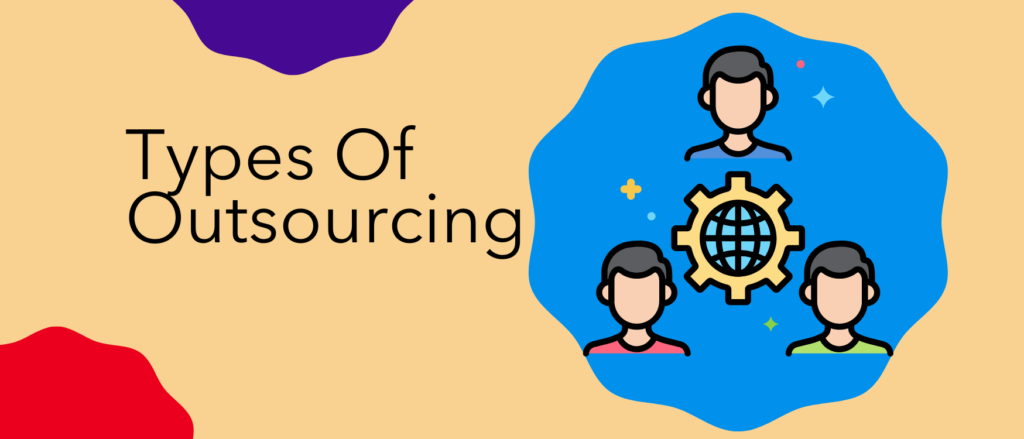
When a business is starting to feel the pressure of not being able to keep up with the growing demand for their products or services, they often consider outsourcing as an option. Outsourcing can come in many different shapes and sizes, but what is the best option for your company?
What are the costs associated with outsourced services? Can you afford it? In this blog post, we will explore the different types of outsourcing and help you decide which option is best for you!
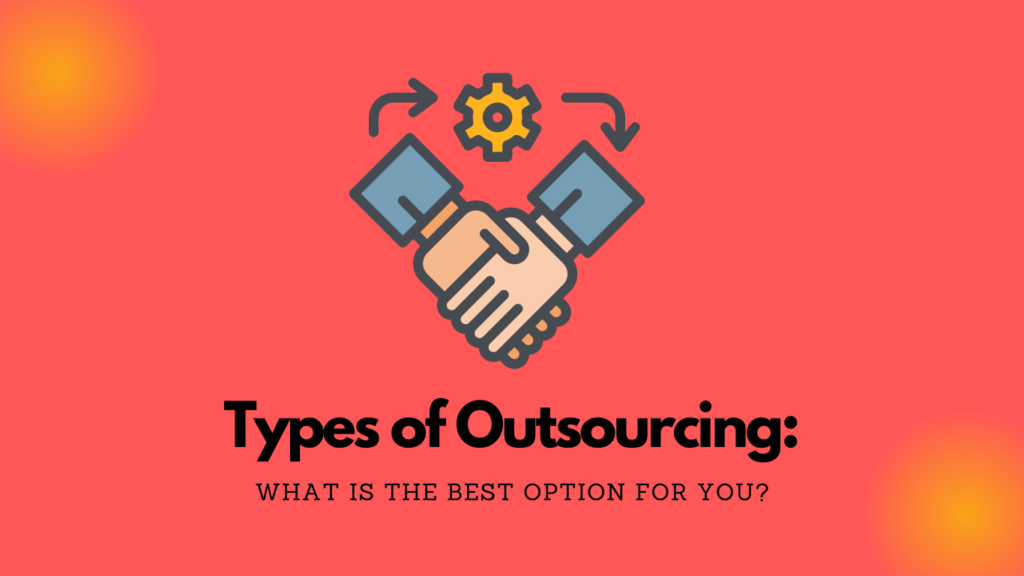
In the process of expanding your business, you have found yourself with a never-ending to-do list and a bunch of business processes waiting to be performed.
All while you are in a corner overwhelmed without knowing what to do.
For these situations, outsourcing services were invented. In fact, outsourcing is not a new concept. This strategy has been around since the early 1800s when businesses, during the boom of the Industrial Revolution, started to settle cost savings strategies. Businesses used to send work to other countries to be completed by cheaper labor.
A.k.a what we know today as offshore outsourcing.
This strategy sounds like a life-saver solution, eh? Nevertheless, do you know what exactly is outsourcing? If not, let’s review the concept behind it!
What Is Outsourcing?
This is a business strategy consisting of delegating a company’s processes to third-party vendors rather than completing these processes with an in-house team.
This strategy is often used as a cost-saving measure for businesses, as outsourcing certain business processes can be cheaper than if the company completes these processes by itself.
One of the great things about outsourcing is that it’s reinventing itself all the time. Without a doubt, outsourcing has come a long way since its invention. Let’s take a short walk back in time!
The Evolution of Outsourcing
This industry has been around for centuries, but it wasn’t until the late 1990s that outsourced services became a popular business strategy.
Nowadays, outsourcing has become an essential part of business operations. Companies are outsourcing all sorts of specialized services: from customer service to bookkeeping and even software development.
We can divide its evolution into 3 key levels:
Tactical
Tactical outsourcing, also known as traditional outsourcing, is when a company outsources a specific function or project to another company.
For example, if your company is short-staffed and needs help with customer service, you would outsource that specific function to an external service provider. This first level was widely used in the 1980s and is still a good option for small businesses.
Tactical outsourcing is usually less expensive and gives the company more control over the project
When you use tactical outsourcing you still maintain control over the project and have the final say on what goes on, but you would not have to worry about hiring employees or training new ones.
Strategic
From the 1990s to the 2000s, businesses were all about competitiveness and optimization, and this is when strategic outsourcing arrived at the game! This second level in the evolution is when a company outsources a complete business process to another company.
For example, if your company wants to focus on its core business competencies, you can outsource the non-core functions of the business, such as human resources or accounting services.
When you use strategic outsourcing, you are giving up more control over the project. In return, you are freeing up time and resources that can be used to focus on your core competencies.
This type is usually more expensive as it requires the other party to invest time and resources into understanding your company
However, strategic outsourcing can be beneficial because it frees up your time and resources so that you can focus on other aspects of your business.
Transformational
This level is what we can call the IT outsourcing strategy! This third and final level of outsourcing is when a company outsources a process or operation to transform it.
This type is usually more expensive than the other two levels. It requires the other company to not only understand your company and its processes but also to make changes to them.
Transformational outsourcing can be beneficial because it can help you improve your processes and operations
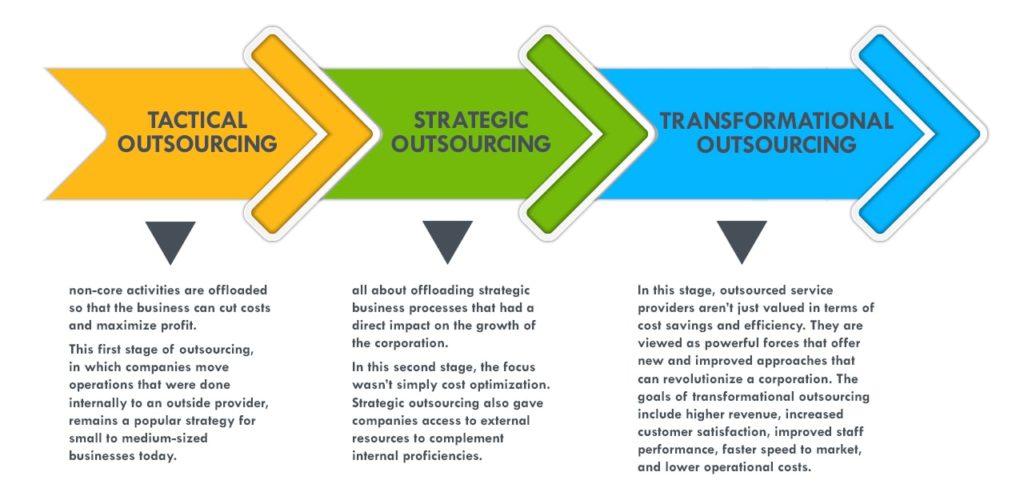
It’s truly remarkable how outsourcing providers passed from managing just a single operation to transforming and leveraging companies at a global scale!
Now, speaking about the world. When you decide to outsource, there is a very wide range of options to consider, and this decision squares down to the specific needs of your company. Do you need to focus on competitive advantage? Do you need to reduce costs? Let’s review which model works best for you!
Outsourcing Models
In recent years, outsourcing has become more sophisticated and specialized, with different models to choose from.
Local Outsourcing
The first arrangement is local outsourcing, also known as domestic outsourcing or onshore outsourcing. As the name suggests, this model consists of establishing outsourced contracts with a company within the same country you are based.
Outsourcing to a local company has its perks:
- You don’t have to worry about cultural differences or language barriers.
- The company is more likely to be familiar with your country’s laws and regulations.
- There is usually less risk involved because the company is located in your country.
Nearshore Outsourcing
Nearshore outsourcing is when you establish a contract with a company in a neighboring country. For example, if your company is located in the United States, you could consider nearshore outsourcing to Canada or Mexico.
There are several benefits of nearshore outsourcing:
- It’s usually less expensive than local because there are often lower work costs in neighboring countries.
- Unlike offshore outsourcing, there is usually less risk involved because the company is located in a nearby country.
- You can still avoid some of the cultural differences and language barriers by outsourcing to a neighboring country.
Offshore Outsourcing
Offshore outsourcing is when you hire professional services from a company in a country that is farther away, such as India or China.
This option has become increasingly popular in recent years because it often provides significant cost savings. However, there are also some risks to consider such as:
- Cultural differences can lead to misunderstandings.
- Language barriers can make communication difficult.
- The time difference can make it difficult to coordinate work schedules.
- The company may be located in a country with less developed infrastructure, which can lead to problems with communication and internet access.
- There may be political instability in the country, which could impact the stability of your arrangement.
- The company may not be familiar with your country’s laws and regulations.
Wrapping up below:
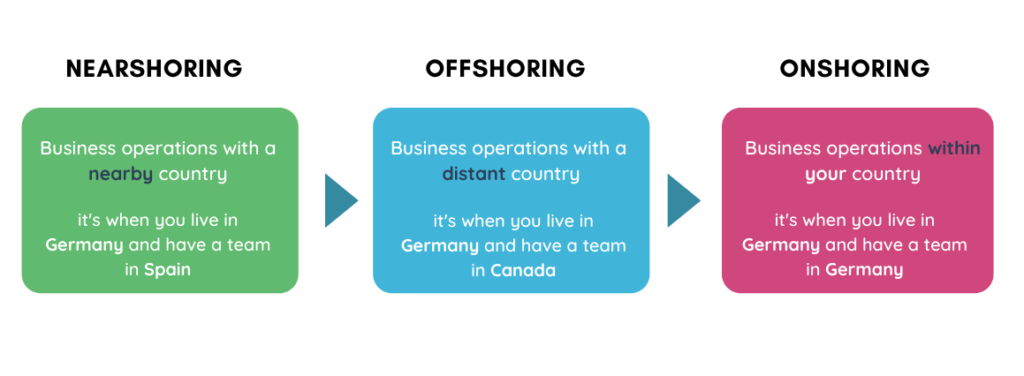
We have explored the different options, which one do you think is best for you? If you are feeling overwhelmed, take a step back and assess your needs.
Do you need help with a specific function or process? Or do you need someone to take over an entire operation? Once you have answered this question, you will be one step closer to deciding which professional outsourcing option is best for you!
Why Outsource?
But, what’s the hype for outsourcing anyway?
In today’s business world, outsourced services have become commonplace. Outsourcing can help you focus on your core company competencies, save costs, and gain access to a workforce with specialized skills.
When done correctly, it can be a great way to improve efficiency and grow your business!
Helps You To Save Money
One of the most common reasons businesses outsource is to save money on labor costs. When you outsource, you can take advantage of lower wages in developing nations. For example, if you outsource customer-service operations to India, you will pay your employees a fraction of what you would pay customer service representatives in the United States.
For example, maintaining a high-quality customer service department can be expensive. By outsourcing, you can save on labor costs and still provide excellent customer service!
You Can Focus on Your Core Business
Another reason businesses outsource is to focus on their core company skills. When you outsource non-core functions, you can free up time and resources that can be better spent on your core company values.
For example, if you run a small e-commerce business, you may not have the time or resources to handle packaging and shipping yourself. In this case, it would make sense to outsource your shipping operations.
This would allow you to focus on running your e-commerce business while leaving the packaging and shipping to a third party.
Gives You Access to Skills and Technologies
When you outsource, you also gain access to skills and technologies that would otherwise be unavailable or too expensive for your business.
For example, if you need software development services, it may be more cost-effective to outsource these services to a company that specializes in that area. This way, you can get the specialized team and technologies you need without having to invest in them yourself.
You Can Improve Efficiency
Another benefit is that it can help improve efficiency within your company. When you outsource, you can take advantage of the expertise of the outsourcing business.
For example, if you outsource your accounting operations to a professional outsourcing business, they will likely have a team of well-versed accountants with the latest accounting software and regulations.
As a result, they will be able to handle your accounting needs more efficiently than if you were to do it yourself.
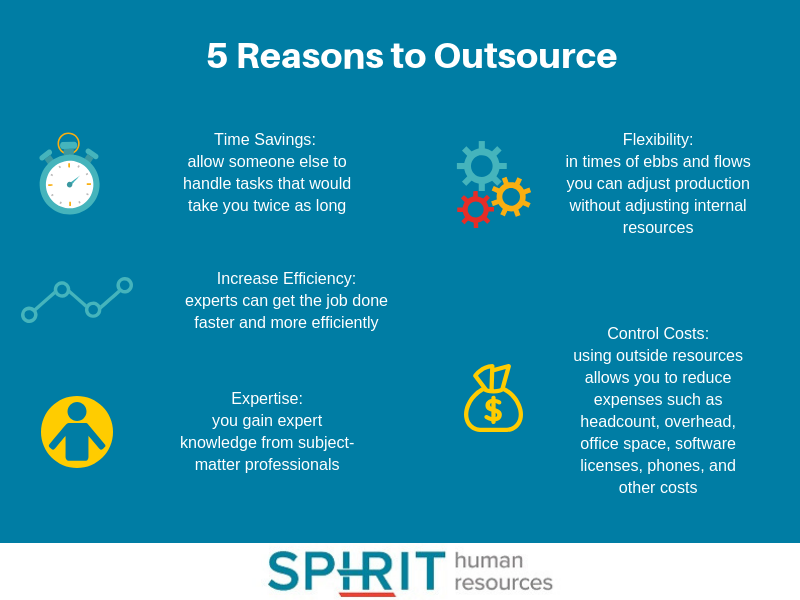
There are many reasons why businesses outsource, but ultimately it comes down to saving time and money while still being able to focus on core company values.
If we look at it closely, outsourcing business functions works wonders, but never forget to hire reputable companies!
Types of Outsourcing: What Is The Best Option for You?
We have covered an important bulk of outsourcing information. Nowadays you can outsource basically ANY service, here is a list of the most common options businesses use.
Business Process Outsourcing (BPO)
Possibly, the most common one is Business Process Outsourcing, or for short: BPO. This happens when a company hires another business to complete certain tasks or processes on its behalf. The type of tasks that businesses typically outsource includes customer service, data entry, telemarketing, and claims processing.
Yet, in the last years, according to Statista, BPO has seen a decline in its market size passing from 36.5 billion U.S. dollars in 2012 to 26 billion U.S. dollars in 2019. The reason? Automation!
The availability of process automation robots is changing the BPO industry as they offer similar levels of quality and process independence.
Nevertheless, there are already business processes outsourcing companies using artificial intelligence. Check Acquire, a company using an AI BPO to improve processing speeds, streamline monitoring methods and reduce human errors.
Professional Outsourcing
When we talk about professional outsourcing, we refer to the hiring of an external company or individual to perform tasks that require a certain level of expertise.
The main difference with BPO is that, while the latter can be done by any type of company. Professional outsourcing requires special skills and knowledge.
For instance, if you need someone to design your company’s website, you would look for a professional outsourcing business that specializes in web design. Other examples of professional outsourcing include architectural services, legal services, and marketing services.
Legislative Outsourced Services
Outsourcing has not only changed the way companies do business but also the way governments work. Legislative outsourcing consists of hiring an external company to help with the creation and implementation of laws and regulations.
One of the main advantages of legislative outsourcing is that it can help government officials save time as they can delegate tasks to experts in specific fields.
In addition, it can also help government officials to be more efficient as they can focus on other tasks while leaving the task of creating and implementing laws to an external company.
Knowledge Process Outsourcing (KPO)
Leave simple tasks to BPO companies! Some businesses prefer to hire outsourcing companies that can provide them with more specialized services, and this is where Knowledge Process Outsourcing (KPO) comes into play.
This type is usually more expensive than BPO, but it can be worth it if you need highly specialized service
KPO outsourcing companies are usually composed of experts in specific fields such as market research, engineering, and accounting. The main difference between KPO and BPO is while BPO companies can perform any type of task, KPO can only provide services that require a certain level of expertise.
Manufacturing Outsourcing
In recent years, outsourcing manufacturing has become increasingly popular as companies look to lower costs and increase efficiency. Manufacturing outsourcing is the process of hiring an external company to manufacture products or components on your behalf.
According to the Supply Chain Management Review, 84% of organizations outsource their manufacturing process to some degree
One of the main advantages of manufacturing outsourcing is that it can help you save money as you don’t have to invest in expensive equipment or facilities.
Also, it can also help you improve your product quality as you can benefit from the expertise of experienced manufacturers.
However, it’s important to note that manufacturing outsourcing can also have some disadvantages. For instance, if something goes wrong with the production process, it can be difficult and costly to fix. In addition, outsourced products may not always meet your exact specifications.
IT Outsource
Hiring an outsourced team for IT services has become increasingly popular in recent years as companies look to lower costs and improve efficiency. IT outsourcing is the process of hiring an external company to provide you with IT services on your behalf.
Some of the most common IT outsourced benefits include website development, software development, and data storage
One of the main advantages of IT outsourcing is that it can help you save money. This way you don’t have to invest in expensive equipment or hire full-time staff.
As well, it can also help you improve your product quality as you can benefit from the expertise of experienced professionals.
Au contraire from the BPO industry, the IT outsourced services market size has been steadily growing in the past years, with a peak during the COVID-19 pandemic. According to a report by Grand View Research, the global IT services market was worth around $715.93 billion in 2020. And, yes! It’s only expected to keep growing.
Telecommunication Outsourcing
Delegating the management of your telecommunications infrastructure to an outsourcing company can help you improve your efficiency and save money.
Outsourced telecommunication is the process of hiring an external company to manage your telecommunications infrastructure on your behalf.
Some of the most common telecommunication outsourced services include network design, network implementation, and network maintenance
One of the main advantages of outsourced telecommunication is that it can help you lower costs as you don’t have to invest in expensive equipment or hire full-time staff.
In addition, it can also help you improve your product quality as you can benefit from the expertise of experienced professionals.
Process Specific Outsourcing
Process-specific is a type of outsourcing that involves hiring an external company to handle specific business processes on your behalf.
Process-specific outsourcing is usually used for tasks that are repetitive and can be easily carried out by workers with relatively little experience.
Some of the most common process-based outsourced benefits include data entry, telemarketing, and customer service
One of the main advantages of process-based outsourcing is that it can help you save money as you don’t have to invest in expensive equipment or hire full-time staff.
In addition, it can also help you improve your product quality as you can benefit from the expertise of experienced professionals.
Legal Process Outsourcing
One of the outsourced services that have been on the rise in recent years is legal process outsourcing (LPO). LPO is the process of hiring an external company to handle your legal processes on your behalf.
Some of the most common LPO services include document review, contract management, and litigation support
This type can be beneficial for both the client and the law firm. The client can save money on legal fees, and the law firm can take on more work than they would be able to do otherwise.
Recruitment Process Outsourced Services
Recruitment process outsourcing (RPO) involves hiring an external company to handle your recruitment processes on your behalf.
RPO is the one that has seen the most growth in recent years. RPO can help companies save money on recruitment fees, and also improve their chances of attracting top talent.
In a report by Grand View Research, the RPO market size was valued at USD 5.48 billion in 2019. It’s expected to grow an 18.5% from 2020 to 2027.
There you go! This is a sneak peek of all the services and products you can outsource. This way, you can ease your burden and focus on your company’s growth!
Outsourcing Best Practices
- Performing a cost-benefit analysis is crucial when deciding to outsource. You need to weigh the costs of outsourcing against the benefits to see if it’s worth it for your company.
- When outsourcing, always make sure to sign a contract that outlines the scope of work and the expectations of both parties. This will help avoid any misunderstandings down the road.
- It’s also important to choose a partner that you can trust. Do your research and read reviews before making your final decision.
- Finally, remember that communication is key when outsourcing. Make sure to keep lines of communication open so that you can provide feedback and address any issues that may arise.
Bottom Line
Outsourcing can be a great way to improve efficiency and save money for your business. However, it is important to choose the right model and understand the risks before deciding to outsource any work.
There are many outsourcing types and each with its own advantages and disadvantages. It’s important that you carefully consider which type is best for your company based on your needs and goals.
Do you want to save money? Improve efficiency? Or do you need the expertise of experienced professionals? The answer to these questions will help you determine the best outsourcing option for you.


